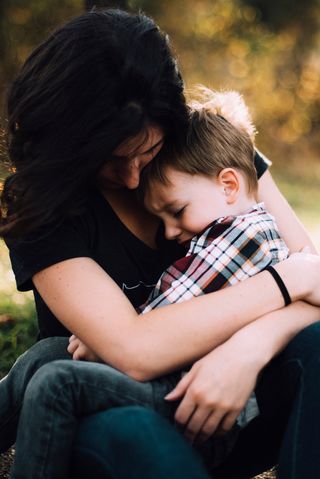“The Three Faces of Eve,” an actual account of an emotionally disturbed young woman in therapy, was a popular book and movie in the 1950’s. It first introduced the public to the concept of multiple personality disorder or as it is referred to today, Dissociative Identity Disorder. In Eve’s breakthrough therapy moment, she goes back to an early repressed trauma at the age of six of being forced by her mother to kiss her dead grandmother goodbye. It was her grief and terror that led to her initially splitting into two distinct personalities. While this is an extreme example of the trauma that death can cause in children, we as a society still struggle with how to deal with children when a loved one is dying.

One of the hardest things for parents to do is talk to their child about death. Many adults are uncomfortable thinking or talking about death. This discomfort is only magnified for them when they have to talk about dying with their children. With good intentions, parents want to protect their children from pain. Yet death is a part of life that children do need to know about. Many parents try to convince themselves that children do not know what is happening when someone is critically ill or dying.
Children overhear things and often know much more than we think they know. They are sensitive to their environment and can sense changes in routines, moods and attitudes of the adults around them. They may not know that death is permanent but they can sense that something very sad has happened. With in-home care, they see doctors and nurses coming in and out and know that something out of the ordinary is happening. It can be a very frightening and confusing time for children if things are not explained to them. Some parents will send their children away from home. Many times the adults are overwhelmed with responsibilities and do not feel they can provide adequately for the children. Others may send them away to avoid telling them that someone is dying. At this time, what children need is the comfort and security of home and close family contact. Sending children away may only serve to make them more anxious and distressed.
The best way to help children deal with death is to provide information and comfort for the level of their development. When children are not given appropriate explanations, their imaginations often come up with things that could be much worse than the truth. What you say to a 3 year old is different than what you say to a 13 year old. For children younger than 5 years, they can be told the person’s body stopped working and that they can no longer breathe, eat, think or talk.
Grade schoolers have a better understanding that death is final. They will respond best to information that is simple, concrete and direct. This is also the age group that is more likely to blame themselves for the death. It is important to give them reassurance that it is not their fault.
Adolescents understand the full meaning of death. However, that does not mean that they are able to deal with the emotional upheaval that comes with it. Adolescence, in general, is a time of turbulent emotions. Recognizing and expressing their feelings following a death can be difficult for them. They may not feel comfortable talking about their feelings. Instead, they may act them out by becoming more reckless and impulsive. Some may withdraw from their family and seek out friends to help them cope, while others may revert for a time to being more dependent and concerned over the remaining family members.
The following are some general guidelines for talking to children about death:
- Be truthful and use the word death. Avoid the use of euphemisms such as telling them that someone is asleep or is taking a trip. Children have been known to develop problems sleeping as a result.
- Present information in a way the child can understand. Be direct, use simple and easy to understand language.
- Be patient. Listen to them and do not be judgmental. Answer their questions. It is also okay to say you don’t know. Keep the conversations short to allow them to absorb what you are saying
- Reassure them that it is not their fault.
- Comfort them, love them and support them in their sadness.
- Let them know that people grieve differently and that there is not only one way to grieve
- Prepare them and instruct them as to what to do and what to expect.
- As age appropriate, allow the children to be involved in some of the decision making and planning. For example, allow the children to decide if they want to attend the wake or the funeral. It is best not to force them.
- It is okay to let the children see you cry. It gives them permission to do so.
- Reading a children’s book about death with them can also be an opportunity for increasing their understanding and furthering dialogue on the subject.
Children have different personalities and different ways of reacting to death. Basically what they need in this process is for the adults to be caring, loving, supportive, willing to listen and answer questions. Regardless of the age, you can never go wrong with a hug, a kiss, and telling them I love you and I will be here for you.


